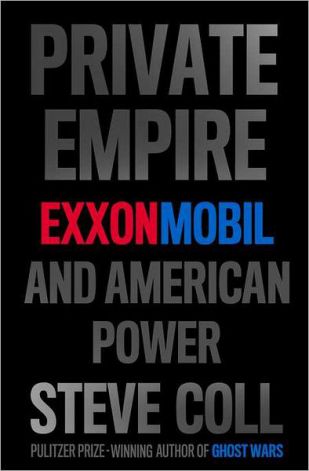For a decade, now, I’ve been a reporter on climate science. And one of my earliest stories was a Mother Jones cover, exposing ExxonMobil’s funding of think tanks that support climate denialism. The piece was actually nominated for a National Magazine Award. It got around.
With this article and others, I contributed a great deal to a narrative that others, notably Greenpeace and this blog, were also forging: Climate science was under attack by corporate interests; leading the charge was ExxonMobil.
As it turns out, if anything that story now appears more accurate than we knew at the time. But there’s a crucial caveat to it—it may not be so accurate any longer, due to changes at the top of the company.
How do we know this? Simple: We read New Yorker writer and Pulitzer Prize winning investigative reporter Steve Coll’s new book Private Empire: ExxonMobil and American Power. I just reviewed this lengthy work in the journal Democracy. You can read the full review here, but I want to summarize the key salient points regarding climate change (the book covers much more than that) below.
Throughout the First Half of the 2000s, ExxonMobil Was Perhaps Even Worse than We Knew.
Coll paints an ExxonMobil run by a domineering climate denier, CEO Lee Raymond, who was in tight with Dick Cheney and quite sure he was right about the issue. Moreover, Coll reports, Raymond felt extremely burned by environmentalists over the ExxonValdez, and that carried over into his approach to the climate issue. As I write in my review:
In 1997, as the Kyoto Protocol loomed, Raymond spent “thirty-three paragraphs of [a] seventy-eight-paragraph speech” in Beijing denying global warming. Trained as a chemist, Raymond was that paradoxical but statistically common phenomenon: a highly intelligent conservative whose intellectual gifts seemed to make him even more dogged and inflexible than conservatives who are less knowledgeable or educated. At a 2000 shareholder meeting, Raymond even cited an oft-debunked “petition,” allegedly signed by 17,000 scientists skeptical of global warming, to back up his case. Just one tiny problem: The petition’s signatures “included those of pop musicians such as the Spice Girls and James Brown,” notes Coll wryly.
And Raymond enforced his denialist view throughout the corporation. “They had come to the conclusion that the whole debate around global warming was kind of a hoax,” says one of Coll’s inside sources. “Nobody inside Exxon dared question that.”
Coll goes on to depict ExxonMobil’s funding of a climate denial echo chamber as one of its most problematic actions. Of the oil majors, no company was so steadfast on this as ExxonMobil, and from Coll, we learn that much of this must be traced to Raymond.
But Rex Tillerson Isn’t Lee Raymond. But here’s the thing. Coll suggests that within ExxonMobil, not everybody liked being known as such an environmental bad guy. Eventually, and for many reasons, the company’s board wanted a change of leadership. And Raymond’s successor Rex Tillerson, in Coll’s account, comes off as a very different dude. As I write:
Enter Rex Tillerson, a man who, in comparison to Raymond, comes across as a milquetoast. About the most interesting thing that Coll has to tell us about him (and it doesn’t at all seem like Coll’s fault) is that he was an Eagle Scout, and fond of drawing not-so-deep lessons from the scouting view of the world. Tillerson had distinguished himself making overseas deals for the company. Like Raymond, he was born a Christian in the heartland; his youthful reading of Atlas Shrugged further suggests an ideology similar to Raymond’s. Yet Tillerson lacked Raymond’s fire and domineering nature—and his flair.
But that’s exactly what ExxonMobil needed; it was time for a change. “We never set out for the company to be public enemy number one,” Tillerson tells Coll.
Tillerson, Coll reports, came in in 2006 and ordered a review of the company’s entire position on climate change, including its funding of controversial think tanks. There was never a stark shift of position, apparently because nobody wanted to directly repudiate Raymond. But there were changes nonetheless, Coll reports, writing about a meeting in 2006 with environmental groups:
The nonprofit leaders asked Cohen [head of ExxonMobil’s public affairs] about the funding he had provided to groups such as the Competitive Enterprise Institute and The Heartland Institute that had so stridently attacked the validity of mainstream climate science. Cohen told them that as part of ExxonMobil’s review of its options on climate policy, the corporation had decided to pull funding from the most controversial groups. The disclosure was the beginning of a quiet campaign to clarify that ExxonMobil had altered some of its public policy funding—without quite admitting that what it had done earlier was wrong or misguided. (p. 345-346)
And the slow change progressed from there. A little known fact is that in 2009, Tillerson actually took a public stand in favor of a carbon tax—the same view espoused by James Hansen.
That’s not to say ExxonMobil is not a conservative company, politically. That’s not to say it doesn’t still fund some conservative organizations that may have troubling climate related positions. However, according to Coll, it really has changed substantially under Tillerson.
Do you buy into Coll’s account? If so, then there’s a lesson for those of us who care about combating climate denial. Namely, it seems very important to publicly criticize, as much as possible, corporations that attack science–so that they become very widely known for this behavior. You may not see them change right away, but if there’s enough of an outcry, you can bet that it is being noticed from within–and upsetting some very important, powerful, and pragmatic businessmen.
Subscribe to our newsletter
Stay up to date with DeSmog news and alerts







